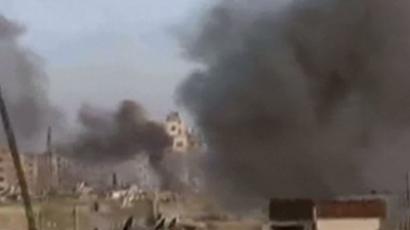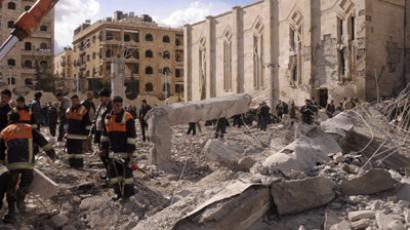Russia and ICRC call for daily ceasefire in Syria
Russia and the Red Cross have called on all sides in the Syrian conflict to observe a daily humanitarian ceasefire. Yet some believe that this would not help prevent further bloodshed.
The move comes after a meeting in Moscow between Russia’s Foreign Minister Sergey Lavrov and the head of the International Committee of the Red Cross, Jakob Kellenberger.The parties said that at the present moment, providing humanitarian aid for those in need is the absolute priority.Moscow has been pushing for a ceasefire for months in a bid to find a diplomatic resolution to the crisis. However, US-based political analyst of the Heritage Foundation Lajos Szaszdi believes a ceasefire is unlikely to be successful as many in the Syrian opposition remain dedicated to the violent overthrow of President Bashar Al-Assad.“The Syrian armed opposition, or the Free Syrian Army, they simply don’t want to have dialogue. They want to continue the fight, to provoke the government forces, so the government is going to respond – and they [will] blame all the violence and civilian deaths on the government,” he told RT. “It has been very successful, this tactic.”Meanwhile, the Syrian government has accused Qatar and Saudi Arabia of supporting recent terror attacks in Damascus and Aleppo. Such accusations, Szaszdi believes, are not completely groundless, because both countries consider themselves involved in a “holy war” in Syria.“The elite in power in the Ba'ath Party of Syria belongs to the Alawite minority, who are Shia Muslim-oriented. That’s why they have close ties with Iran and also the Shia-dominated government of Iraq,” he explained. “For [Sunni-oriented] Saudis [and] the Qataris, this is something they cannot tolerate. They don’t like the fact that, for instance, the government of Syria has been supporting Hezbollah – a Shia Muslim group.”
The country has witnessed another escalation of violence, following a number of bomb blasts in the capital Damascus and the country’s second city, Aleppo, over the weekend.A car bomb exploded in a residential district of Aleppo on Sunday, killing two people and wounding a further 30. Meanwhile, in Damascus, 27 people were left dead on Saturday after twin explosions targeted security installations in the city.













